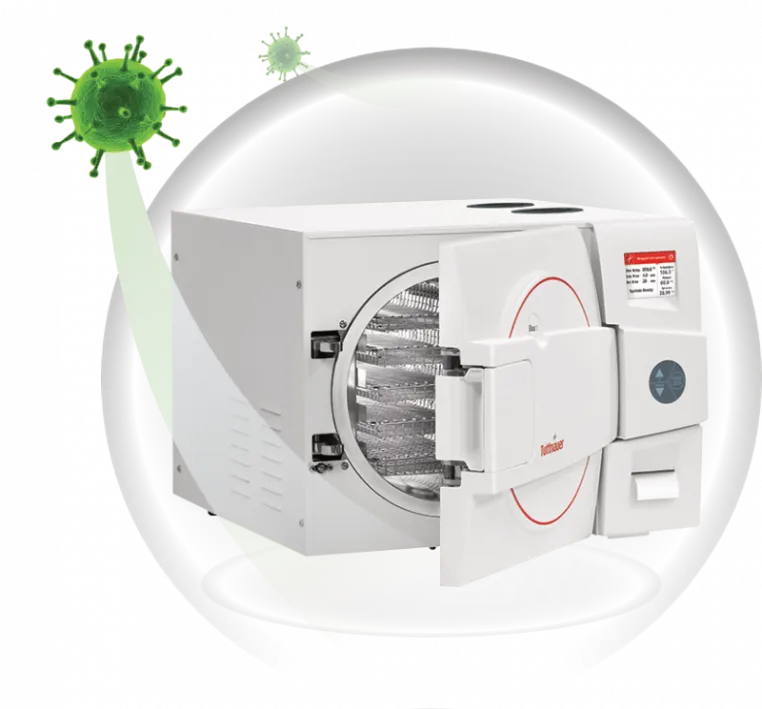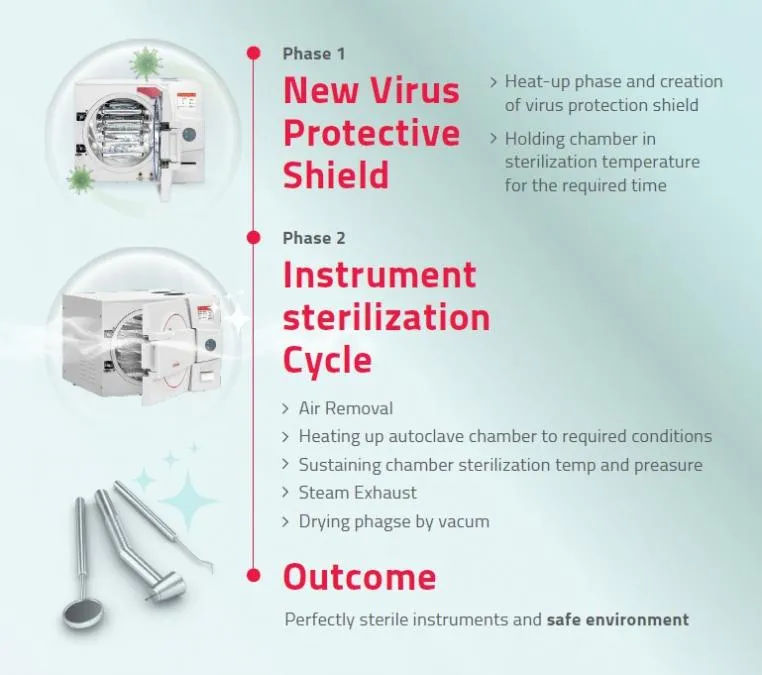
Fighting Contamination
Healthcare professionals; Doctors, nurses, and lab professionals are particularly vulnerable to infectious diseases. Medical staff members are exposed to more viral particles than the general public.
Healthcare professionals, including dentists, ophthalmic doctors, and medical care providers, are at high risk. In essence, they can encounter diseases and infections daily and typically work close to one another and their patients. Research has shown that Dentists face a high risk of catching Coronavirus.
As coronavirus cases grow, asking medical personnel to go into isolation for an extended period, after they have been exposed could leave hospitals, clinics, and labs understaffed, triggering a critical national and global situation.
The need to protect customers has driven Tuttnauer's R&D department to investigate the risks of using an autoclave and design a new coronavirus protective shield of defense.
We have called it the Virus protective shield; in fact, it provides extra protection against any harmful viruses like the Coronavirus.
The Challenge
Ensuring air is treated before removed from the autoclave chamber
Over the years, dental and medical instruments have become more sophisticated; many of them made of extremely narrow tubes and folds. One of the challenges of the sterilization process is the air removal stage, especially when considering narrow, hollow, and wrapped instruments. Complete air removal is needed to verify the sterilization process since steam can only penetrate where air is removed. The most advanced and efficient air removal method is by vacuum.
But is the air removed from the autoclave decontaminated?
When you start a sterilization cycle, the first phase is air removal, which occurs before sterilization has begun. The air removal will eventually enable ideal steam penetration during the sterilization phase.
Think about it: a contaminated load enters the Autoclave, the start button is clicked, initiating the first stage of air removal from the autoclave chamber.
Today, with the Coronavirus pandemic and the staggering cross-infection rates, we developed an extra safety measure that secures the air released from the Autoclave at the pre-vacuum stage. The load and the air in the autoclave chamber are treated, making it free of viruses, including, of course, minimizing the threat of Coronavirus being released into the air.
How does the new virus protection cycle work?
The new Virus Protective Shield cycle was designed to address harmful viruses as the Coronavirus, before the air removal stage. Air removal will occur only after the space inside the chamber has reached disinfection, significantly reducing the risk for contaminated air being released into the clinic.
Applying the virus shield protective cycle creates the desired safe external environment for the autoclave users and staff, and only then can the autoclave cycle run.

Conclusion
Although we are in the middle of a crisis and we do not know when or how it will end, we know that it is our moral obligation to learn and develop better protection measures to stop the current coronavirus outbreak as well as future unexpected pandemics. Governments and healthcare systems have developed strategies to fight the Coronavirus, and Tuttnauer is now providing a meaningful contribution by offering the new class B autoclave with a virus protective shield. A unique dental and medical autoclave that treats the air removed from the Autoclave, by adding another layer of protection, never used before.
Often, at times of crises and pandemic, humanity is driven to find better solutions to old problems. We are confident that this new autoclave cycle is a game-changer.
About Tuttnauer
Tuttnauer provides end to end sterile processing solutions for dental and ophthalmic clinics, including advanced autoclave sterilizers, washer-disinfectors, indicators, and sterile processing products. The new Class B autoclave with a virus protective shield is a highly advanced autoclave explicitly developed for dental, ophthalmic and medical practices by providing an extra layer of protection. The Autoclave goes above and beyond standards by meeting all sterilization needs and creating cyclic parameters that accommodate with the most challenging loads, ensuring load sterility, efficient drying, helping dentists achieve today's challenging workloads and provide superior patient care, without risking cross patient contamination.